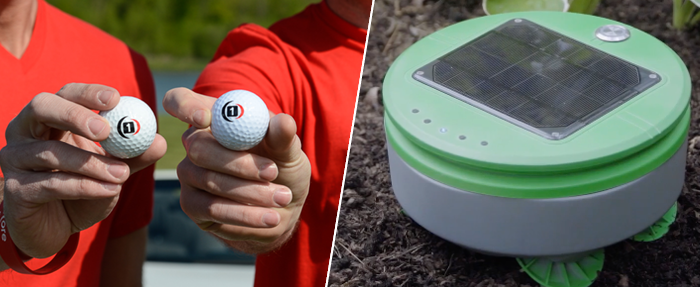
Every month, Arrow awards flash funding to an Indiegogo campaign with Arrow Certified Technology. This December, we have multiple winners! Tertill and GENiUS Ball both won $75k in flash funding from Arrow as part of the Arrow Certification Program. Become part of the Arrow Certification Program to qualify for flash funding, and read on to learn about both of their entrepreneurial journeys.
Success in the Garden of Weedin’: Tertill’s journey to Flash Funding
There’s an old proverb that says, “No life is without difficulties; no garden is without weeds.” True, difficulties may be a necessary part of life, but weeds in gardens? Rory MacKean, CEO of Tertill, is trying to turn them into permanent mulch — and he’s looking to robots to do the dirty work.
Realizing his (robotic) vision
MacKean and his team of garden-loving robotics engineers are doing it with Tertill, their weed-killing robot, which has gained significant traction on Indiegogo and is now celebrating $75,000 in Arrow flash funding.
The idea of task-oriented robots has long fascinated MacKean. Since his student days, he’s seen small, simple robots as the key to automating day-to-day life. Most robotics companies, however, focus on building complex, programmable robots, an approach to robotics that MacKean sees as less immediately beneficial to individuals.
Throughout his career, MacKean’s projects pushed the envelope of automation, but he felt like his machines weren’t actually doing anything. “Frankly it’s hard to get excited about robots that just drive around,” MacKean says.
MacKean eventually joined Harvest Automation, a company that designs robots to move potted plants around commercial nurseries and greenhouses — a flavor of the task-oriented robotics he was after — where he met like-minded engineer Joe Jones, inventor of the Roomba vacuum cleaner. They bonded over their passion for applied robotics, and they started thinking about how they could design robots to help regular people.
Already working with plants, they decided they could join forces to automate away the age-old scourge of gardens: weeds.
Taking robots into the garden
Their answer was Tertill, the world’s first robot for the home garden. Tertill is a small, purpose-built robot that rolls through your garden, scouring the area for unwanted freeloaders, killing them with a miniature weed whacker.
The name Tertill combines terra, the Latin word for earth, and till, the ancient process of preparing soil for planting seeds. With slow yet methodical movements, solar panels attached to its back, and a duck-footed stance, its resemblance to a turtle played a part in its name as well.
MacKean sees Tertill as a way to enhance the hobby of gardening by taking away its less desired aspects. “People work in their gardens because they love gardening,” MacKean says. “Of course everyone loves the springtime when you plant the seeds, and the late summer when you have more tomatoes than you know what to do with. But the middle part? That isn’t always fun.”
Tertill allows home gardeners to enjoy weedless vegetable and flower gardens without the monotony and frustration of weeding. Gardeners can also breathe easy with a chemical-free weeding option. “Essentially, the goal is to make the gardner more productive with the hours they spend in the garden. We just want happier gardeners,” MacKean says.
Validating their concept with Indiegogo
Hoping to maximize their reach, MacKean and his team knew early on that Indiegogo InDemand was the right place to increase funding, and to continue to grow Tertill’s audience. “This is a product that people have not seen before, so it was important to get validation from the market,” MacKean explains. “If you show someone a cool concept, they might say, ‘Yeah, I want one!’ But when money is involved, you get a true gauge of whether they actually want one.”
Starting an InDemand campaign also gave MacKean and team something to work toward as they refined their go-to-market message. “The preparation for the InDemand campaign itself was what gave us such a strong foundation to build our tactics on,” MacKean says. “We spent a lot of time figuring out what stories we wanted to tell. When you only have a few seconds to tell a stranger why the product is interesting to them, the story starts to shine through after a while.”
Weeding out early concepts with Arrow
The Tertill team’s R&D coworking space had a hardware lab sponsored by Arrow, so they’d heard about the Arrow Certification Program early on. Receiving the Arrow Certified Technology badge fueled backers’ excitement for the campaign, who could immediately see the product was high quality, in addition to innovative and helpful in the garden.
For MacKean, the certification process was much more than a badge, though; it was a true partnership with the leading parts company. During the prototyping phase, for example, Arrow recommended local manufacturing partners who could quickly fulfill orders for specialized parts. “For a mobile robot, you need all the parts integrated and working before you can really test it. You need the electronics, the motor drivers, the wheels,” MacKean explains. “It all needs to work before you can test it.” Partnering with Arrow enabled the team to take an iterative approach and make rapid design changes to their prototypes, something that would have been otherwise impossible.
Growing the weeding market with Arrow flash funding
As the latest Arrow flash funding winner, the Tertill team now has an extra $75,000 to expand in their market. “With this, we’ll be able to grow the company beyond our initial production run. Now we’ll be able to build up inventory, which is something I don’t think we would’ve been able to do nearly as quickly otherwise,” MacKean says.
Working closely with Arrow as part of the Arrow Certification Program, MacKean, Jones, and the rest of the Tertill team are thrilled to have been chosen as a flash funding recipient. “Having flash funding lets us take Tertill and run with it,” MacKean says. “We’re excited for what the future holds.”
Learn more about GENiUS Ball, the other flash funding winner, and find out how GENiUS Ball is using $75k in flash funding for their data-enhanced golf ball.
Smart Ball Hits the Green: How GENiUS Hooked Arrow Flash Funding
The great American golfer Arnold Palmer famously said, “Golf is deceptively simple and endlessly complicated; it satisfies the soul and frustrates the intellect.” But what if a golf ball could amplify a player’s intellect? Would golf satisfy the soul even more?
Keith Blakely and Robert Samuels of OnCore Golf Technology products are on a quest to figure this out. That’s why they’ve invented the GENiUS Ball, the world’s first golf ball to enhance the sport through data and analytics.
The genesis of GENiUS
In an industry known for purists and the status quo, the OnCore team likes to shake things up. Five years ago, they made a name for themselves with the Caliber, the first golf ball with a hollow metal core. The Caliber revolutionized the golf ball industry with its unique feel, durability, and unparalled driving accuracy.
Always searching for ways to push the boundaries of what a golf ball can do, Blakely and Samuels saw the hollow core as an opportunity. “We were fascinated with putting a chip inside the ball that could measure the ball’s movements,” Blakely says. They started sketching out which kinds of chips could fit inside and what information they could capture.
But before getting too far, they hit a bunker. A hollow metal sphere makes an outstanding golf ball core, but it also makes an excellent Faraday cage — a metallic enclosure that blocks electronic signals. Even the best data would be held prisoner in its 0.9-inch diameter cell. Hopes dashed, they shelved the idea.
Then came a stroke of fortune. In 2013, the USGA, the official ruling body of professional golf, expanded their definition of what constituted an “allowable” golf ball core to include rigid materials, not just the traditional rubber cores of the past. “It was groundbreaking,” Blakely says. “Immediately we started thinking of all the possibilities — plastic composites, polymers, ceramics.”
After they received a patent for their hollow composite polymer core ball design, Blakely and Samuels dusted off their plan and got to work. “We realized we had something we could use to protect electronics without interfering with the electronic sensor’s ability to communicate with the outside world,” Blakely says. The GENiUS Ball was born.
The world’s first smart golf ball
The GENiUS Ball is intended to be the world’s first golf ball to analyze a golfer’s game based on actual performance on the course. Using miniaturized sensors inside its unique core, the GENiUS Ball captures relevant performance data and relays it back to any mobile phone, where the player can track performance in real-time and also on the computer where progress can be studied over time.
What makes the GENiUS Ball so powerful is its ability to measure performance during actual gameplay on the golf course. Until now, golfers had to rely on clunky ‘launch monitors’ in golf entertainment centers to measure their performance. But something is lost when a player has to drive a ball into a heavy green curtain inside a room at a shopping center. “It’s all so hypothetical,” Samuels explains. “It’s not measuring how you react to the course.”
Blakely and Samuels envision the resounding impact of comparing performance metrics against other players on a given hole. “By comparing performance to others, in a certain sense, we’re redefining the concept of par,” Samuels says. “It allows players to focus on their downside and increase the quality of the game. And frankly, the enjoyment of the game.”
Proving the concept with Indiegogo
Hoping to validate their concept before jumping in headlong, the OnCore team knew early on that Indiegogo was the right place to raise funding for the GENiUS Ball. “Because we have an existing golf ball company, we have to be careful that we aren’t diverting any time or financial resources from what is the main business of the company,” Blakely says. “We said to ourselves that if we can raise funds with crowdfunding, we can justify investing resources.”
Starting an Indiegogo campaign also gave Blakely and team a solid platform to build buzz for their concept. “We wanted to put ourselves in a position that when we go to market, we don’t have to completely start from scratch,” he explains. “It’s paid off. CNBC, Forbes, Chicago Tribune — they’ve all covered us. And these are the mainstream media, not just golf publications, watched by golfers and non-golfers alike.” With Indiegogo, the OnCore team has received extensive publicity they wouldn’t have otherwise gotten, helping them to build buzz before the product arrives.
Getting off the ground with Arrow
The OnCore team dealt with Arrow early on in the prototyping phase to source chipsets, so they knew about the Arrow Certification Program from the beginning. In fact, the certification process was a primary reason the OnCore team went with an Indiegogo campaign in the first place. “When we were evaluating what kind of crowdfunding campaign we wanted to run, our rep had mentioned Arrow Certification,” Samuels explains. “We were still undecided whether we wanted to go with Indiegogo or another crowdfunding company. When he said we had a shot at flash funding, that was just the cream on top.”
The Arrow team was also instrumental in getting the GENiUS project off the ground. “I give our Arrow rep a ton of credit for our success so far because he knows the catalog,” Samuels says. “You have a conversation with him, and you get an understanding of what kinds of products are going to be out next week, which gave us more lead time. I loved working with him on the design process of this.”
The GENiUS Ball is unparalleled in its capture of player performance data. As a next step, the team plans to take advantage of IBM resources to apply artificial intelligence to their virtual golf ball. IBM is the official Cloud Technology partner of the Arrow Certification Program, and entrepreneurs receive no-charge access to developer, IOT, analytics and security services to help them rapidly develop their product.
GENiUS Ball hits the green with flash funding
As the latest Arrow flash funding winner, the OnCore team now has an extra $75,000 to focus on finishing the prototype design. “We did more than a couple of high fives when we found out,” Blakely says.
For Blakely, Samuels, and the rest of the OnCore team, receiving flash funding has galvanized the project. “The conversations we’ve had because of our campaign make us highly confident that this is a highly intriguing product for golfers,” Samuels says. “Now getting flash funding changes the dynamic and catalyzes the other financing that we want to do. It’s a triple win for us.”
Arrow has given away almost $1,000,000 in flash funding this year to Indiegogo campaigners, so check back before the holidays to learn the final winner of flash funding in 2017. Join the Arrow Certification Program and see how Arrow can help you take your idea to the next level.


